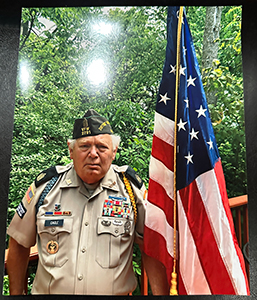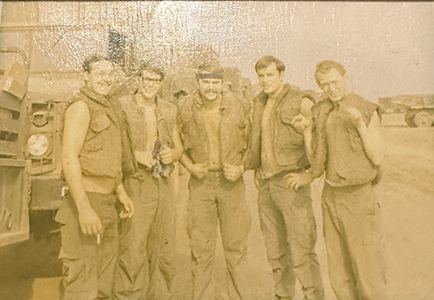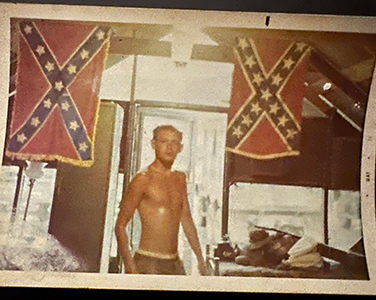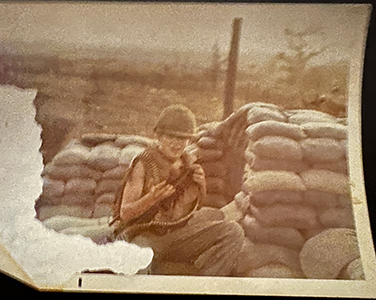U.S. Army Vietnam War Homer Glen, IL Flight date: 07/12/23
By Frank Hauenschild, Honor Flight Chicago Veteran Interview Volunteer
Coming from a multi-generation family of coal miners, Fred was born in Hazard, Kentucky, to Columbus and Lois Jean Cagle. Watching his father going to work in the mines during his younger years, Fred attended school and assisted his mother with chores around the house. Fred’s father, seeking a more financially secure life for his family, moved to Harvey, Illinois, when Fred was 12-years-old. Fred’s father took a factory position at the Whiting Corporation and Fred attended Lowell grammar school. Completing his grammar school studies, he then attended Thornton High School.
“It was good in Harvey, but I was a free spirit, which was not good as I had a few run-ins with the local authorities during my teen-age years. Nothing serious, but I was heading down the wrong path at that time, ” Fred explained. A local judge also agreed and gave Fred an ultimatum, “Son, you have two choices, the first one is that if you continue your present lifestyle, you will be seeing a lot more of me and will be spending a lot of time in a place where you will not have a lot freedom of movement. The second choice is to enlist in the military service.” With those choices, Fred spoke to the local Army recruiter at the Harvey Post Office.
On his second visit with the recruiter, this time with his father present to waive the age requirement as Fred was still 17 at the time, Fred enlisted in the U.S. Army. “Things happened pretty quickly after that. I, along with other recruits, were bussed to O’Hare and placed on a plane to Fort Bragg, North Carolina, for basic training.” Following basic, Fred was assigned to Fort Benning for his AIT and Airborne training and then was assigned to Kaiserslautern, Germany. “Still being under 18, I was not eligible to be sent to Vietnam,” Fred related.
After serving in Germany for about a year, Fred wanted a change and went to see his Sergeant. “I told my Sergeant that I wanted to volunteer for Vietnam, which brought a very strong response from him.” “I’ve been there, you don’t want to go to Vietnam!” the Sergeant retorted. Finally relenting, Fred’s Sergeant gave in and processed his request and told Fred that he would see what he could do for him as far as assignments.
Landing in Vietnam at Cam Ranh Bay, Fred asked how he would get to Long Binh, where he thought he would be assigned when he left Germany. “The answer I got was – get in the plane!” Fred’s next stop would be in Chu Lai, Vietnam. Arriving in Chu Lai, Fred again asked how he would get to Long Binh, “It was a familiar response, get in the chopper!” Fred’s next stop was at Fire Base Hawk Hill.
Serving with the 196th Light Infantry Brigade, which was part of the Americal Division, he was then assigned to Fire Base Mary Ann. A lot of notable people served in the Americal Division during the Vietnam War: Colin Powell, Norman Schwarzkopf, and NFL player Rocky Bleier who was wounded and then returned to the NFL. “They were not there when I was assigned there, but there was a notable history with the 196th. Despite the history of the 196th, “I was still a kid then, I did what I was told to do while I was there,” Fred related.
Fred was getting ready for his R&R and his plans were to go to Thailand with his unit buddies, Bill and Mike. He related that their plans were all firmed up and at the last minute, all leaves were cancelled. He later learned that the enemy were making plans for an attack on his base. They didn’t have to wait long.
In the early morning of March 28, 1971, an elite force of the Viet Cong Army, known as sappers, cut through the outer protective wires of Mary Ann and began their attack. “The firefight was brutal, Fred explained as he remembered that many VC sappers made it into the base and attacked bunkers and fire positions. “It was a long day,” Fred recalled, “artillery support was coming in and Huey helicopters were flying in and out with supplies and carrying out the wounded.” At the end of the battle, 33 were dead and 83 were wounded.
Fred completed his tour in Vietnam and was discharged from his first enlistment with the Army and was assigned to the US Army Reserve Control Group (USAR). “I never got my R&R in Thailand, or anywhere else for that matter!” Leaving the Army, he returned to Harvey and private life. Gaining employment at Wyman-Gordon in Harvey, IL, Fred completed his GED and took college classes at Thornton Community College, which was on the same campus as Thornton High School. “I was doing all right by then, even though my parents returned to Hazard, KY with my siblings. I was married and had a house in Harvey” Fred stated.
In July, 1973, Fred transferred from the USAR to the Army National Guard for one-year under the “Try One in the Guard” program. That lasted for a few years until Wyman-Gordon began laying off workers during the decline of the industrial period in Harvey and the surrounding areas. With little opportunity in the private sector in Illinois for him at that time and not wanting to return to Kentucky to continue his family’s tradition of working in the coal mines, Fred decided to re-enlist in the Army.
Fred re-enlisted for a 3-year hitch and was assigned to the Signal Company, 12th Special Forces Group at Fort Bragg. Little did Fred realize at that time that this 3-year enlistment would be a career for him. Leaving Fort Bragg, in January, 1983, and still impressed with his first Drill Sergeant at boot camp, Fred requested training as a Drill Sergeant. His assignment request was granted and he began training at the Drill Sergeant Academy at Fort Bliss, Texas.
Fred said that the class was nine-months long and that “it was the toughest class I have ever taken! I was old compared to others in the class being 34-35 years old at the time, and the only Vietnam vet in the class!” Fred recalled. He related that during the nine-month course that many recruits washed out and were re-assigned. Fred remembered that they started with 63 students and only six graduated at the end of the class. Many were not cut-out for being a Drill Sergeant because they were not that intimidating in size and/or stature and that resulted in them being washed out of the Academy. The final test was a 15-mile March in New Mexico during the summer. “We started at 3 a.m. and it was hot then and just got worse!” Many just collapsed and had to be carried off during the march. “I finished, not by much, but I finished,” Fred stated. “Toward the end of the march, I kept my sanity by whistling the Andy Griffith theme song, it helped, right to the end of the march when I crossed the finish line and promptly collapsed!” Fred chuckled. He related that it was some of the worse harassment he ever experienced in his lifetime. “Ten times worse than my basic training Drill Sergeant at Benning.”




Fred went on to be a Drill Sergeant for three assignments. Two basic training assignments were at Fort McLellan, Alabama, and one basic training class at Fort Jackson, South Carolina. When Fred was the Drill Sergeant for his assignments, it was “24/7 work for 12 straight weeks” with the new recruits. He related that “It was mentally and physically draining; they would give the Drill Sergeants a few months of light duty after graduating a class to recover!” And when the next assignment would arrive, Fred would prepare by watching R. Lee Ermey in “Full Metal Jacket.” “It was a different time than when I was a Drill Sergeant, but it would motivate me!” Fred stated.
While a Drill Sergeant at Fort McLellan, his unit was assigned to a one-year tour in support of Operation Desert Storm in 1991. “It was a one-year assignment, but the combat phase was over in about five weeks, and we returned home at Ft. Bliss,“ Fred explained. Following his return to Ft. McLellan, Fred was promoted to First Sergeant and assigned to B Company, 2nd Battalion, 353rd Regiment at Ft. McClellan.
In 1997, and as a First Sergeant, Fred was selected to attend the Sergeant Major Academy in Ft. Bliss, Texas. “It was a 12-month course, we called it the ‘Gentlemen’s Academy,’ all classroom studies which lasted about six hours a day,” Fred recalled. He stated that all of the rooms on the base were occupied and he and a few others were quartered at the local Holiday Inn. “We always made it back to the Holiday Inn during the Happy Hour on the weekdays!” Following his graduation, Fred was promoted to Command Sergeant Major in April, 1998, the highest rank an enlisted person could attain.
Being a Command Sergeant Major, Fred was re-assigned to the 330th Command Support Hospital at Ft. Stewart, Georgia. Here Fred’s assignment was to train personnel in a leadership role and to be the liaison for the Battalion Generals and Company Commanders. “These were not your usual Army personnel, they were officers who were doctors, nurses and other specialists in the medical field. My job was to train them to set-up MASH units in the field.” Fred explained. As many of these came from Reserve Units and were in private medical practice when called to serve prior to Operation Enduring Freedom, Fred recalled one special reservist who was activated. He was a doctor and was a little older than the usual reservists. Fred was surprised when he saw his papers for activation and realized that the Army had activated an 80-year-old doctor! Fred promptly took him to his commanding officer who then commenced the necessary paperwork to return him to private practice.
On February 24, 2003, his unit was deployed to Southwest Asia. Early on during his deployment, he sustained an injury to his hand and was sent back to the States. He was transferred to the Dwight D. Eisenhower Army Medical Center at Fort Gordon, Georgia. As tests progressed, Fred was diagnosed with CIPD (Chronic Inflammatory Demyelinating Polyradiculoneuropathy), an autoimmune disorder affecting the nerves in his hands. Fred was then ordered to appear before a Physical Evaluation Board (PEB) at Fort Sam Houston, Texas due to his condition.
At the hearing on April 15, 2005, still having a little of his “free spirit” of his youth, he protested to the Hearing Board about the possibility of being medically discharged from the Army. “I wasn’t ready to retire and wasn’t going to leave,” Fred recalled. Being admonished by his JAG attorney at his side, he protested to the Board and said he could do his job, even with his CIPD. At the conclusion of his respectful “tirade” before the Board, the Board recessed and then came back with their decision, Fred would be honorably discharged from the US Army with a 100% disability.
Returning to his home in Orland Park, Illinois, with his second wife, Cindy, Fred followed up with doctors at the Jesse Brown VA Hospital. During many follow-up visits with his doctors, they confirmed his suspicions that his CIPD was caused by Agent Orange in Vietnam. Fred was informed that the Army could not place blame for his disorder by Agent Orange, but his doctors at the VA could and made a medical record for Fred that his CIPD was caused, in most likelihood, from Agent Orange.
Fred and his wife, Cindy, now reside in Homer Glen, Illinois. They both enjoy retirement and their children and stepchildren. Fred, not taking retirement from the military life sitting, joined the VFW 2791 Bremen Post, Tinley Park IL and serves as post commander.
Thank you Sergeant Major Fred Cagle, US Army, for your dedicated service to our country! Enjoy your well-deserved Honor Flight with your fellow veterans!


